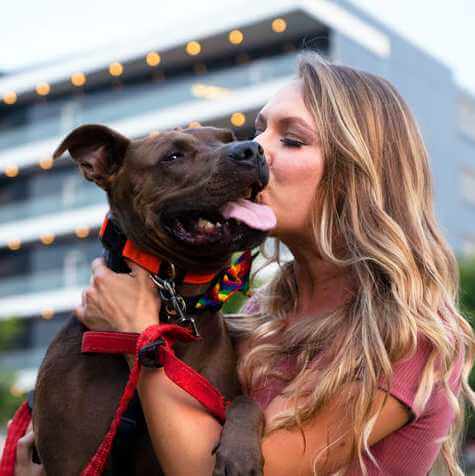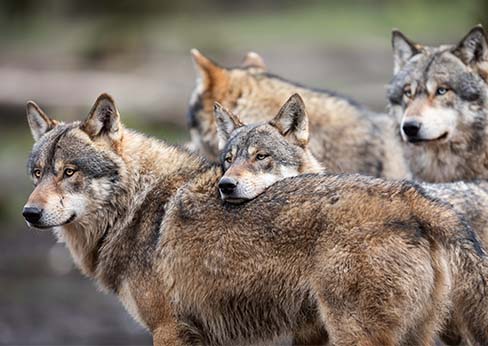In this post:
- Wild wolf packs
- Do dogs consider us as pack members?
- Is the term “alpha” applicable in pack roles?
- Are we pack members with our dogs?
- How can I be a pack leader or the alpha dog?
- Should I “dominate” my dog?
We’ve all heard about wolf packs and how a wolf’s behavior dictates their position in the pack’s social hierarchy. Those same ideas seem to be generally accepted in the domesticated dog world, but exactly how similar they are is still widely debated.
So where do we as owners come into play? When we adopt a dog, do they consider us to be a part of their pact, or are they able to recognize the difference in our relationship?
In this article, we get into what exactly a pack is and what role humans play in it. If you are looking for more insight into your dog’s behavior, then read on!
Wild Wolf Packs
In the wild, wolf packs consist of a mated couple and their offspring. As the wolves’ offspring mature, they leave their parents and form their own packs. However, it is important to note that much of the study of wolf behavior came from observing captive wolves. In these facilities, multiple adults of the same age were kept together. This brings the validity of the information into question since these situations would never occur in the wild.
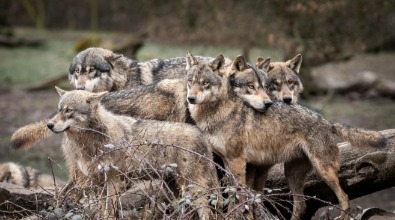
Do dogs consider us as pack members?
Domestic dogs have evolved with human beings for at least 40-50 thousand years, and while we co-evolved together, our species became very close.
Dogs are unique among all species of animals because of this co-evolutionary, very close relationship with humans. Dogs have now become dependent on humans. And humans, at least for an extended part of our evolutionary history, we’re dependent on dogs.
So while there is a strong relationship, it is not a pack relationship. Think of it more as a co-evolutionary cooperative relationship.
Is the term “alpha” applicable in pack roles?
When reviewing the literature regarding wolf hierarchies, we found that modern biologists do not refer to wolves using terms such as “Alpha” or “Pack Leader.” Instead, they use phrases like “mating male,” “mating female,” or “mating pair.” Due to their extensive research, we now know that wolf packs are more like family units rather than a strict military hierarchy.
Are we pack members with our dogs?
Pat Miller, CBCC-KA, CPDT-KA, CDBC reminds us that “We are not dogs!” Therefore we should not try to act like dogs – we have built a human/dog relationship that has outlasted the test of time. Dog’s rely on us for survival, and while our dependence on dogs has changed, we still have a use for them as guard dogs, hunting partners, service dogs, and companions.
Dogs also communicate differently to us than they do to members of their own species. This means that trying to communicate with a dog in the same way they interact with other dogs will just end up leaving everyone confused. Dogs know that we are not dogs, so they do not expect us to act as they do. Just like expecting a dog to behave like a human is impossible! We will never be able to communicate effectively with our pets if we start acting like an animal that we’re not.
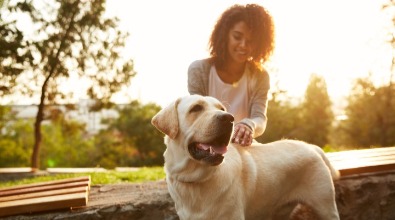
How can I be a pack leader or the alpha dog?
Dominance hierarchy based training methods assumes dogs are aggressive and committed to continually challenging their owners for supremacy. These training methods are incorrect and not supported by any scientific study. The trainers advising families to take charge of the pack by eating first, walking through doors first, and worst of all, physically pinning the dogs into submission are ignoring the current scientific research and subjecting the dog to unnecessary and sometimes cruel training methods.
The truth of the matter is that dogs are not trying to take over the pack or be in charge. Dogs learn how to interact with humans by assessing what works and what doesn’t. Because dogs are fantastic students of human behavior, they will draw conclusions base on your response. Punishment, deference, and fear as training methods do not foster a mentally, emotionally, and behaviorally sound dog.
Instead of trying to be the “alpha” dog in your house, teach your dog to not worry about things, that you will take care of them, and he just needs to focus on being himself. Plus, we are usually not competing for our dog’s resources (and definitely not for mating!).
Should I “dominate” my dog?
“Hovering over him, interfering, alpha rolling, and rolling him over on his back and so on is NEVER a good idea. They are not expressing dominance toward the human, they are expressing dominance toward another dog. Any kind of action taken by the human is going to be completely misinterpreted by the dog. It is going to be interpreted as an attack. “Hey, I’m over here dealing with this other dog and some limited resource of some kind, and all of a sudden you attack me!” That is never is a good thing for the relationship between humans and dogs.” – Dr. James C. Ha, Ph.D., CAAB
“The hovering over, the alpha rolling, are not dominance signals. They are not part of dominance aggression. Wolves don’t do them. Wild dogs do not do them. So again it’s the wrong individual expressing dominance trying to control the situation, and then that wrong individual is doing it the wrong way. So it is even MORE likely to be simply interpreted as an attack by a human. And that results in all sorts of other issues and problems and relationship issues and so on. So it’s most definitely not a good idea.” – Dr. James C. Ha, Ph.D., CAAB
Final Thoughts:
Dogs want to please their humans and love being part of a human family. They are social creatures and prefer being part of a group, which is why they are such loyal companions. By giving your dog boundaries, leadership, guidance, and love, both you and your dog will have the relationship you desire.
Special Thanks To …

Dr. James C. Ha, Ph.D., CAAB
Dr. James C. Ha, Ph.D., CAAB is a professor of applied animal behavior at the University of WA and a certified applied animal behaviorist with over 30 years of experience in animal behavior teaching, research, consulting, and expert witness services. Aly was privileged enough to be in his Applied Animal Behavior Certification program.
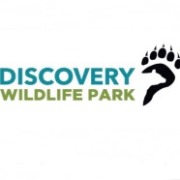
Discovery Wildlife Park
Discovery Wildlife Park is a refuge for orphaned and unwanted wildlife. They provide “forever” homes for animals who are not able to be returned to the wild. It is located on a 90-acre park with over 30 species of orphaned animals. They offer many family fun adventures from visiting the animals in their zoo to camping.

Fort Rickey Children’s Discovery Zoo
The Fort Rickey Discovery Zoo is a special kind of petting zoo with a focus on children and healthy family fun. Everything they do centers on the understanding that, for kids, passive observation of zoo animals is not enough. Children need to be engaged. They need to use all their senses to explore, manipulate, and discover. They strive to provide the highest quality care for our animals while providing the best in healthy, outdoor family entertainment and education.

